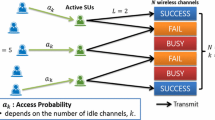Abstract
In Cognitive Radio (CR) networks, CR user has to detect the spectrum channel periodically to make sure that the channel is idle during data transmission frame in order to avoid the collisions to the primary users. Hence recent research has been focused on the interference avoidance problem. Quality of Service (QoS) requirement of CR user will affect the time of data transmission in each frame. In this paper, in order to solve the interference avoidance and spectrum utilization problems without cooperation among CR users, a new scheme to obtain the optimal duration of data transmission frame is proposed to maximize the spectrum utilization and guarantee the protection to the primary users. The main advantages of our proposed scheme include the followings: (1) QoS requirement of CR user is concerned; (2) p-persistent Media Access Control (MAC) random access is used to avoid the collisions among CR users; (3) CR network system capacity is considered. We develop a Markov chain of the primary spectrum channel states and an exponential distribution of the CR user’s traffic model to analyze the performance of our proposed scheme. Computer simulation shows that there is an optimal data transmission time to maximize the spectrum utilization. However, the regulatory constraint of the collision rate to the primary users has to be satisfied at the expense of spectrum utilization. And also the tradeoff between the spectrum utilization and the capacity of the CR system is taken into account.
Similar content being viewed by others
References
Federal Communication Commission. Spectrum policy task force. Rep. ET Docket No. 02-135, November 2002.
J. Walko. Cognitive radio. IEE Reviews, 51(2005)5, 34–37.
A. Ghasemi and Elvino S. Sousa. Spectrum sensing in cognitive radio networks: requirements, challenges and design trade-offs. IEEE Communications Magazine, 46(2008)4, 32–39.
H. Urkowitz. Energy detection of unknown deterministic signals. Proceedings of the IEEE, 55(1967)4, 523–231.
Xuping Zhai and Jianguo Pan. Energy-detection based spectrum sensing for cognitive radio. IET Conference on Wireless, Mobile and Sensor Networks, Shanghai, China, Dec. 2007, 944–947.
Y. Pei, A. T. Hoang, and Y-C. Ling. Sensing-throughput tradeoff in cognitive radio networks: how frequently should spectrum sensing be carried out? IEEE 18th International Symposium on Personal, Indoor and Mobile Radio Communications, Athens, Greek, Sep. 2007, 1–5.
Y. C. Liang, Y. Zeng, E. Peh, et al. Sensing-throughput tradeoff for cognitive radio networks. IEEE Transactions on Wireless Communications, 7 (2008)4, 1326–1337.
A. Ghasemi and Elvino S. Sousa. Optimization of spectrum sensing for opportunistic spectrum access in cognitive radio networks. 4th IEEE Consumer Communications and Networking Conference, Las Vegas, NV, USA, Jan. 2007, 1022–1026.
Yiyang Pei, Ying-Chang Liang, and Kah Teh Kwok Li. How much time is needed for wideband spectrum sensing. IEEE Transactions on Wireless Communications, 8(2009)11, 5466–5471.
S. Zheng, Y. C. Liang, P. Y. Kam, et al. Cross-layered design of spectrum sensing and MAC for opportunistic spectrum access. IEEE Wireless Communications and Networking Conference. Budapest, Hungary, Apr. 2009, 1–6.
X. Zhou, Y. Li, Y. H. Kwon, et al. Detection timing and channel selection for periodic spectrum sensing in cognitive radio. IEEE Global Telecommunications Conference, New Orleans, USA, Nov. 2008, 1–5.
W. Y. Lee and Ian. F. Akyildiz. Optimal spectrum sensing framework for cognitive radio networks. IEEE Transactions on Wireless Communications, 7(2008)10, 3845–3857.
Hyoil Kim and Kang G. Shin. Efficient discovery of spectrum opportunities with MAC-layer sensing in cognitive radio networks. IEEE Transactions on Mobile Computing, 7(2008)5, 533–545.
J. Shen, S. Liu, L. Zeng, G. Xie, G. Jin, and Y. Liu. Optimisation of cooperative spectrum sensing in cognitive radio network. IET Communications, 3 (2009)7, 1170–1178.
E. C. Y. Peh, Ying-Chang Liang, Yong Liang Guan, et al. Optimization of cooperative sensing in cognitive radio networks: a sensing-throughput tradeoff view. IEEE Transactions on Vehicular Technology, 58(2009)9, 5294–5299.
Hangyu Cho and J. Andrews. Upper bound on the capacity of cognitive radio without cooperation. IEEE Transactions on Wireless Communications, 8(2009)9, 4380–4385.
R. Urgaonkar and M. J. Neely. Opportunistic scheduling with reliability guarantees in cognitive radio networks. IEEE Transactions on Mobile Computing, 8(2009)6, 766–777.
S. Geifhofer, L. Tong, and B. M. Sadler. Cognitive medium access: constraining interference based on experimental models. IEEE Journal on Selected Areas in Communications, 26(2008)1, 95–105.
L. Kleinrock and F. A. Tobagi. Packet switching in radio channels: Part I-carrier sense multiple-access modes and their throughput-delay characteristics. IEEE Transactions on Communications, 23(1975)12, 1400–1416.
F. A. Tobagi and L. Kleinrock. Packet switching in radio channels: Part II-the hidden terminal problem in carrier sense multiple-access and the busy-tone solution. IEEE Transactions on Communications, 23 (1975)12, 1417–1433.
Author information
Authors and Affiliations
Corresponding author
Additional information
Supported by the National Natural Science Foundation of China (No. 61171094, 61001077, 61071092), 973 Program (2007 CB310607), and National Science & Technology Key Project (2011ZX03001-006-02, 2011ZX03005-004-03).
Communication author: Zhu Qi, 1965, female, Professor.
About this article
Cite this article
Li, H., Zhu, Q. Optimization of spectrum utilization in cognitive radio system. J. Electron.(China) 28, 450–459 (2011). https://doi.org/10.1007/s11767-012-0609-1
Received:
Revised:
Published:
Issue Date:
DOI: https://doi.org/10.1007/s11767-012-0609-1




